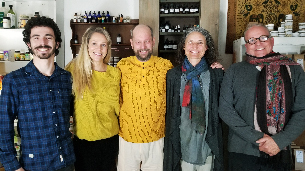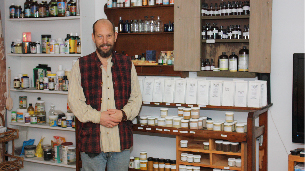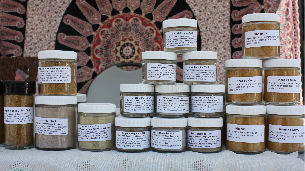
Infertility is an alarming modern epidemic affecting more couples than ever. 1 out of 6 couples today experience difficulty falling pregnant. What was once seen as a woman's problem is now known to affect men equally.
Strategies You Can Immediately Implement to Treat Infertility and Boost Fertility Naturally
The natural approach to treating infertility solves the root causes of infertility, by addressing all body systems, rather than just focusing solely on the reproductive system.
Many couples who can't become pregnant suffer from a combination of sub-clinical conditions. These conditions can't cause infertility on their own but -- in combination -- they can substantially reduce a couple's probability of conceiving.
1. Minimize your exposure to toxic chemicals
Exposure to environmental toxins (in the form of industrial chemicals) both in utero and neonatally may dramatically affect adult fertility. Most chemicals used in everyday life do not go through the same checks medicines do. Consequently, poisonous chemicals end up circulating in our environment, food supply, air and water.
The strongest evidence of heavy metals and environmental pollution adversely interfering with healthy reproductive function in women has been found for lead. Other compounds that can alter hormone function and result in adverse reproductive health effects include:
Ovotoxicants: can disrupt or even stop ovulation.
Endocrine disruptors: can interfere with hormone function and cause endometriosis and PCOS.
Phthalates: in plastic food containers, cling wrap, IV bags, medical supplies, vinyl flooring and packaging at high levels have been associated with miscarriage and testicular toxicity. At low levels they disrupt hormonal balance.
VCH chemicals: used in rubber tires, plastics and pesticides.
PAH: released from cigarettes, car fumes and road tar
Men are not spared!
Sperm seems to be more sensitive to heavy metals and industrial pollutants than eggs. Many sperm abnormalities have been linked to these toxins. The majority of these chemicals can be found in the atmosphere, on the ground in cities and in the waterways.
They have also been termed "reprotoxicants" for their negative effects on sperm development and maturation. Studies confirm male sperm counts are declining, and environmental factors, such as pesticides, exogenous estrogens (Xenoestrogens), and heavy metals may negatively impact spermatogenesis (formation of sperm).
The top 6 environmental toxins to avoid:
Pesticides: found on non-organic fruit and vegetables, meat, dairy and unfiltered tap water
Formaldehyde: found in air fresheners, deodorants, floor polish, upholstery cleaners
Bisphenols: found in plastic containers and can leach into food and water.
Organic solvents: petroleum based liquids found in household products, electronics, car repair, health care, photography, agriculture, printing, construction and cosmetics and many more.
Dry-cleaning chemicals
Paint fumes
Occasional exposure to one or the other toxic chemical is not of concern. What is of concern is accumulation of these chemicals over a long period.
2. Don't drink unfiltered tap water
Our waterways are constantly being polluted by industrial waste and byproducts, pharmaceutical drugs, pesticides and herbicides and commercial cleaning products.
There are many companies polluting the water regardless of the country you live in. Either there is no environmental law at all, or there are loopholes in the law or there is no law for the XYZ chemical getting into the water.
Heavy metals are the most common of the reprotoxins reaching our water supply through industrial waste, jet fuel exhaust residue and a variety of other sources.
Pharmaceutical drugs are commonly found in tap water. 74 percent of the US population take prescription drugs. Because the drugs do not metabolize fully, small quantities are excreted via feces and urine and flushed away.
Toilet water is often treated and filtered before being discharged into lakes and rivers thereby re-entering the water supply. The trouble is, many drugs are not filtered out via the regular filtration process. Minute quantities of chemotherapy drugs, contraceptive pills, antidepressants, anxiolitics, anabolic steroids, HRT (hormone replacement therapy), heart drugs etc. have been found in tap water.
Use a dual filtration system
Buy a dual filtration water system that filters particles smaller than 1 micron (this will filter out the drugs as well as heavy metals). Use the filter in your shower and your kitchen. Shower steam contains the same chemicals, which you can end up inhaling and can be absorbed through your skin.
3. Aim to eat an optimal fertility diet
In the first trimester of pregnancy your growing embryo will increase 20 million times. In the first 8 weeks your baby's organs, hands, fingers, legs, feet, head, eyes, nose, ears etc. are being constructed. To ensure the best possible foundations are laid down during this phase, you want to make sure there are plenty of building blocks in the form of the right nutrients in the right combinations.
What does a fertility diet contain?
An optimal fertility diet is about what to avoid as much as it is about what to include. A fertility diet should be as fresh as possible and organic wherever possible. Key elements are; good quality protein sources and good fats.
What should you eat?
Raw milk and dairy, Organic meat in small quantities, game, small deep sea fish like sardines and red snapper, organic legumes home cooked (not canned).
Whole grains, nuts, seeds, vegetables and fruit in season, organic where possible.
Increase your consumption of good fats and avoid dangerous fats. Good fats include monounsaturated fats in olive oil, polyunsaturated fats in oily fish and nuts and midchain fatty acids found in coconut oil.
For cooking use clarified butter (ghee) or coconut butter (without flavor) as they do not become unstable when heated.
For non-heated oil requirements (salads etc) use cold pressed olive oil, flaxseed oil and nut oils.
4. Avoid dangerous fats
Did you know -- consuming trans fats hidden in foods such as; doughnuts, biscuits, lollies, candy, chocolate, chips, pies, fries, take aways and thousands of other foods may increase your risk of infertility by as much as 70 percent?
Scientists from the Harvard University School of Public Health advise women wanting to get pregnant to avoid all trans fats. The sole purpose of adding trans fats to food is to extend its shelf life. To minimize your consumption of trans fats be diligent about reading the ingredients and avoid the most likely culprits altogether. Trans fats are mostly listed as 'hydrogenated fat' or 'hardened vegetable fat' or simply 'vegetable fat.'
5. Minimize animal-derived estrogens
Dairy products account on average for 60-70 percent of estrogens consumed. Humans consume milk from cows in the second half of pregnancy when cows estrogen levels are high.
Do you think an excess consumption of all these hormones could disrupt your own hormonal balance? You bet!
Consumption of milk has been linked to certain cases of male infertility.
6. Allow yourself time before trying to conceive
There is a common misconception that egg and sperm quality can not be improved. In fact, it is possible to improve the quality of your egg and sperm however, it takes 120 days. This is because it takes approximately 120 days for eggs to mature and sperm to develop. During the generation and maturation of gamete cells -- sperm and ovum -- that form an embryo, everything that you and your partner ingest, inhale or are exposed to will influence the health of your eggs and sperm for better or worse, and the ultimate quality of the genetic building blocks you pass onto your child.
This is why it's crucial to follow a good preconception plan for a minimum of 4 months before conception. A baby is a 50-50 product of his or her parents -- therefore optimizing the quality of eggs and sperm is of paramount importance.
Woman who suffer from recurrent miscarriages often have partners with low sperm counts and visually abnormal sperm. Therefore both partners should detox, follow a fertility diet, take preconception supplements and avoid reproductive toxins discussed in this article for minimum of 4 months before conception.
7. Avoid coffee, smoking and alcohol
You may not want to hear this, but drinking coffee decreases fertility. And did you know that women who drank coffee before and during pregnancy had twice the risk of miscarriage?
Alcohol is harmful to women's eggs and men's sperm and as little as one glass can reduce fertility by 50 percent! This can further lead to damage of the developing embryo and may result in miscarriage. And although it's been known for a long time that drinking while pregnant is a no-no, drinking before pregnancy has been largely ignored.
This doesn't stop with coffee and alcohol. Smoking and recreational drugs can also reduce your odds of conception. A study tested the effects of cigarette smoking on semen quality in men and found that sperm motility (ability to propel forward) decreased in light smokers while heavy smoking produced abnormal sperm shape. Scientists have discovered that quitting smoking may increase sperm count in men who quit smoking for 5-15 months by 50 percent to 800 percent respectively.
8. Take a good quality preconception and pregnancy supplement
Regardless of whether you are eating organic produce and a healthy diet, you are unlikely to be getting all the nutrients your body needs for optimal fertility from your diet. This is why supplementation is important.
Getting pregnant and growing a new human being with your own reserves, requires a surplus of nutrients and energy. In your body's accounting terms, pregnancy is a luxury, a splurge of energy and nutrients. Some of the key nutrients for fertility are:
Zinc
Selenium
Magnesium
Calcium
B12
B6
Folic acid
Vitamin C
Omega-3 fats
9. Have sex a lot!

















